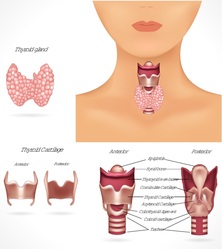Hypothyroidism

Hypothyroidism is a common endocrine disorder resulting from deficiency of thyroid hormone. The severity of symptoms in adults ranges from very mild deficiency states that are barely detectable (subclinical hypothyroidism) to severe deficiency states that are life-threatening (myxedema). A deficiency of thyroid hormone may be due to defective hormone synthesis or lack of stimulation by the pituitary gland.
Signs and Symptoms
|
|
Causes
Iodine deficiency was once the most frequent cause of hypothyroidism. Although today most Americans get plenty (and sometimes too much) of this trace mineral from iodized table salt, there still exists a significant minority who don’t get enough or whose absorption is impaired. Currently, the most frequent cause of hypothyroidism is Hashimoto’s disease, an autoimmune disorder in which the body manufactures antibodies that attack thyroid tissue and suppress production of the thyroid hormone. Stress, nutritional deficiencies, inactivity, some medications, and hormonal fluctuations as a result of pregnancy and menopause also have a role to play.
If you are experiencing any of the symptoms above, please contact Dr. Linda Gedeon for proper evaluation and to discuss the best treatment options for you.
Iodine deficiency was once the most frequent cause of hypothyroidism. Although today most Americans get plenty (and sometimes too much) of this trace mineral from iodized table salt, there still exists a significant minority who don’t get enough or whose absorption is impaired. Currently, the most frequent cause of hypothyroidism is Hashimoto’s disease, an autoimmune disorder in which the body manufactures antibodies that attack thyroid tissue and suppress production of the thyroid hormone. Stress, nutritional deficiencies, inactivity, some medications, and hormonal fluctuations as a result of pregnancy and menopause also have a role to play.
If you are experiencing any of the symptoms above, please contact Dr. Linda Gedeon for proper evaluation and to discuss the best treatment options for you.

